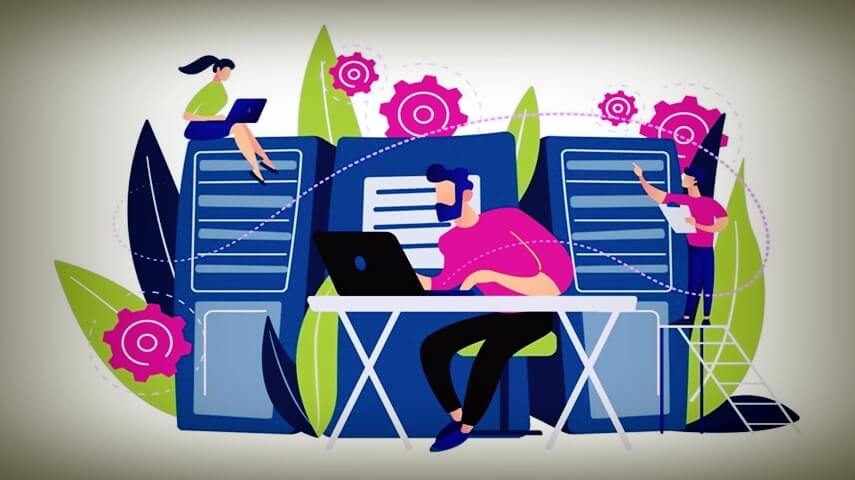Virtual Work Advantages
Virtual work can be both convenient and challenging, as it requires discipline and effective strategies to maintain productivity.
Nowadays, working remotely has become a widely accepted and essential aspect of modern professional life. It offers unprecedented flexibility and convenience, allowing individuals to collaborate with teams, communicate with clients, and tackle tasks from any location.
However, virtual work has its advantages, it also presents unique challenges that can impact productivity and efficiency. As such, it is crucial to develop effective strategies with digital workplace software to optimize virtual work environments and enhance productivity.
In this, we shall explore valuable tips and techniques for improving productivity while working virtually.
6 Tips to Create a Productive Online Workspace
1. Importance of Communication
- Avoiding Misunderstandings: Communicating clearly reduces the risk of misunderstanding and misinterpretations that can arise due to the absence of non-verbal signs in virtual interactions.
- Effective Collaboration: In virtual teams, communicating effectively to make sure that team members can collaborate seamlessly, share information, and work towards common goals.
- Project Clarity and Direction: Clear communication provides clarity about project objectives, project timeline, and deliverables, and provides the power to team members to stay on track and aligned.
- Enhancing Productivity: When instructions and expectations are conveyed clearly via a task management solution, team members can focus on their tasks without the need for constant clarification or back-and-forth communication.
- Building Trust and Relationships: Transparent and unambiguous communication encourages trust among virtual team members and leads to stronger professional relationships and effective teamwork.
- Clarification Goals and Expectations: When goals and expectations are communicated clearly, team members can have a better understanding of what is expected of them, which leads to higher performance and responsibility.
- Resolving Issues Promptly: Clear communication allows for timely identification and resolution of any issues or challenges that may arise during virtual work
- Avoiding Overwhelm: Giving a lot of information clearly to team members and receiving relevant information without being overloaded with excessive details.
- Minimizing Communication Errors: Clear communication reduces the likelihood of communication errors, leading to more accurate and effective interactions.
2. Dressing Professionally at Work
Dressing appropriately in a virtual workspace holds significance for distinct reasons.
- Professionalism: Virtual interactions are still professional interactions. Dressing properly shows respect for colleagues, clients, and the work environment, maintaining a level of professionalism.
- Positive first impression: Your appearance in virtual meetings or video conferences is the first impression others have on you. Dressing professionally helps to create a positive and favorable impression.
- Brand representation: When representing your company or brand in virtual meetings, dressing properly aligns with the company’s image and value.
- Boost Self-Confidence: Dressing professionally can enhance your self-confidence and mindset for the day, leading to better performance and communication.
- Focus and Productivity: Wearing appropriate clothing can help you mentally transition into work mode, promoting focus and productivity during virtual work sessions.
- Visibility and Recognition: In larger virtual meetings, dressing professionally can help you stand out and be recognized as a serious and committed team member.
3. Build Self-Confidence
Building self-confidence in the workplace is essential for personal growth, professional success, and positive interaction with colleagues. Here are some effective strategies to help you boost your self-confidence at work.
- Recognize your strengths: Identify and acknowledge your skills, talents, and accomplishments. Understanding what you excel at will enhance your confidence in tackling various challenges.
- Set and Achieve Goals: Establish realistic and achievable goals for your work. As you accomplish these goals, you will gain confidence in your abilities to handle challenges and succeed.
- Focus on Self-Improvement: Continuously seek opportunities for learning and professional development. Expanding your knowledge and skills will bolster your confidence in various situations.
- Accept Mistakes as Learning Opportunities: Everyone makes mistakes. Instead of dwelling on them, view them as a chance to learn and grow. Embracing a growth mindset will boost your self-confidence.
- Avoid Comparing Yourself to Others: Focus on your progress and growth rather than comparing yourself to colleagues. Everyone has unique strengths and weaknesses, and your value is not determined by comparing yourself to others.
- Celebrate your Achievements: No matter how little your achievements look be proud enough to agree Celebrating successes supports your self-worth and enhances confidence.
- Practice Good Body Languages: Maintain eye contact, stand/sit up straight, and use open body language. Positive body language conveys confidence to both you and others
- Manage Stress: Implement stress-reducing techniques such as meditation deep breathing, or exercise. Managing stress helps you to stay composed and focused, enhancing your confidence in handling challenging conditions.
Remember, building self-confidence is a gradual process. Be patient with yourself and practice these strategies consistently.
4. Effective Work-from-Routine
Creating an effective work-from-home routine is a key to maximizing productivity and maintaining work-life balance. Here are some steps to help you establish a successful routine.
- Set Clear Work Hours: Determine your daily work hours and stick to them consistently. Having set hours helps to create boundaries between work and personal time.
- Designate a workspace: Set up a dedicated and organized workspace that is free from distractions.
- Plan Your Day: Start each day creating a to-do list or schedule using automation software. Prioritize tasks based on urgency and importance to stay focused throughout the day.
- Take Regular Breaks: Schedule short breaks throughout your workday. Stepping away from your desk can improve focus and prevent burnout.
- Minimize Distractions: Identify potential distractions and find ways to minimize them. This might involve turning off social media notifications or using noise-cancelling headphones.
- Review and Reflect: At the end of each day or week, review your accomplishments and assess what worked well and what could be improved in your routine.
5. Develop Your Computer Skills
Developing computer skills in a virtual workspace is essential for staying productive, efficient, and competitive in the digital age. Here are some steps to enhance your computer skills:
- Participate in Webinars and Workshops: Attend webinars and virtual workshops related to computer skills and technology. These workshops provide valuable insights and practical tips from industry experts.
- Practice Regularly: Implement your learned skills regularly. Create documents, Spreadsheets, presentations, or even personal projects to apply and reinforce what you have learned.
- Collaborate virtually: Work on virtual team projects that require computer skills. With team collaboration tools, collaborating with others can expose you to different perspectives and techniques.
- Stay Updated: Technology evolves rapidly, so stay updated on the latest trends and advancements. Follow industry blogs, subscribe to tech newsletters, and participate in online tech discussions.
- Learn Keyboard Shortcuts: Mastering keyboard shortcuts can significantly speed up your computer tasks and improve your efficiency.
- Teach Others: Teaching others what you know can reinforce your understanding and memory of computer skills. Offer to help colleagues or friends with their tech related questions
As you develop your computer skills, you will become more confident and capable in virtual workspace, leading to enhanced productivity and professional growth.
6. Important of Setting Goals
- Direction and Focus: Goals provide a clear direction and purpose for your action. They help your priorities tasks and focus your efforts on what truly matters, preventing aimless wandering and wasting time.
- Motivation: Goals act as a powerful motivator. When you have a specific target to work towards, you are more likely to stay committed and persistent in your efforts to achieve it.
- Overcome Procrastination: With well-defined goals, it becomes easier to overcome procrastination. Having a sense of purpose encourages you to tackle tasks and avoid unnecessary delays.
Closure
Working virtually can be a highly productive and rewarding experience when we approach with the right mindset and strategies. By creating a structured routine, setting goals, and optimizing communication by using a no-code platform, you can unlock your full potential in the virtual world.
Embrace the flexibility and opportunities that remote work offers, while also maintaining a sense of professionalism and work-life balance. Remember, with focus, dedication, and a proactive approach, you can achieve peak productivity and excel in your work journey.




